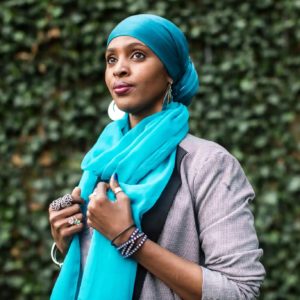FGM – A Painful Reality
 By Key Correspondents for the Irish Global Health Network, Jiewon Lim and Filsan Essa
By Key Correspondents for the Irish Global Health Network, Jiewon Lim and Filsan Essa
A “traditional health ritual” to keep women sacred, whilst neglecting all impacts on her physical being, mental status, and sexual life. This is the truth of female genital mutilation (FGM).
During her keynote speech at the 2019 Global Health Exchange, Somali-Irish activist Ifrah Ahmed highlighted the severity of this phenomenon as she shared the reasons as to why her voice and public appearance will bring a change to her native Somalia, and the bordering countries where FGM remains prevalent. Ms. Ahmed is herself a survivor of FGM, and started the Ifrah Foundation to campaign against this harmful practice in order to let fellow survivors know that all of their voices matter.
Ms. Ahmed opened her talk by addressing the arduous reality of the belittling of women’s rights and the conservative culture of not being able to freely converse about reproductive organs and sexuality. Against this backdrop, the Ifrah Foundation plays a key role in advocating for legislation to ban FGM around the world and raising medical and social awareness of such practices by educating local communities. Ms. Ahmed’s work through her Foundation has to-date prevented numerous FGM procedures, saving young girls from being mutilated, and her vision is firmly set upon saving millions more who are at risk.
Currently it is estimated that more than 20 million women around the world have undergone FGM during childhood. This puts them at severe risk of complications such as infections, pain and trauma from having sex, and even death.[1] In many cases, the procedure is carried out using unhygienic and unsafe tools such as razors, without any of the protections that a legitimate surgical procedure would offer. For Ms. Ifrah and the others that fight for the eradication of FGM, the medical dangers of this ritual accompanied by cultural pressures magnifies the earnestness to eradicate such practice.
Ms. Ahmed came to Ireland as a refugee from Somalia. Support from the Irish government has allowed her voice to be heard globally, and she believes that Ireland can help give the same impact for many other girls as it has to her. Ireland confirmed its zero-tolerance policy towards FGM when the it nationally declared FGM as a crime in 2012, through the Criminal Justice (Female Genital Mutilation) Act 2012.[2] Furthermore, the Children First National Guidance for Protection and Welfare of Children incorporated FGM as a form of child abuse in 2011.[3] Publicly pronouncing laws and boundaries is the first step towards working with other countries to understand the danger and overcome harmful practices such as FGM.
Ms. Ahmed made it clear that FGM is a deep-rooted cultural practice that has no place in today’s society. FGM can be a traumatic experience for young girls to bear, and has repercussions throughout their adult life. For this reason, Ms. Ahmed vows and encourages others to “be the voice and not the victim” and unite together on the road to eradicating FGM worldwide.
References
1. World Health Organisation. (2018) Fact Sheet on Female Genital Mutilation. Geneva, WHO. https://www.who.int/en/news-room/fact-sheets/detail/female-genital-mutilation
2. Government of Ireland. (2012) Criminal Justice (Female Genital Mutilation) Act 2012. Dublin, Government of Ireland. http://www.irishstatutebook.ie/eli/2012/act/11/enacted/en/html
3. Government of Ireland. (2019) Policy Information: Children First. Dublin, Government of Ireland. https://www.gov.ie/en/policy-information/d1b594-children-first/
24 September 2019
CATEGORIES
- Equity in Action Blog
- Training Programmes
- Sponsorship
- Vaccine Equity
- Get Global – Global Health Talks
- Student Outreach Team
- Get Global Young Professionals Talk Global Health
- Global Health Matters – Live Event Series
- Global Health Matters – IGHN Live Event Series
- An initiative of Irish Global Health Network
- ESTHER Ireland and ESTHER Alliance for Global Health Partnerships
- Global Health Matters – Webinar Series
- ESTHER
- IGHN Conferences
- Global Health Conference 2020
- Women in Global Health – Ireland Chapter
- ESTHER Partnerships
- Weekly Webinar Series
- 4th Global Forum on HRH
- Access to Medicines
- Archive Page Weekly COVID Webinars
- Clean Cooking 2019
- Climate Change and Health Conference 2017
- Conference Abstracts
- Conference Materials
- Covid FAQ
- COVID Funding Opportunities
- COVID-19
- COVID-19: Gender Resources
- Dashboard and online resources
- Education
- ESTHER Alliance
- Events
- Events & News
- Funding covid
- Global Health Exchange 2018
- Global Health Exchange 2019
- Global Health symposium 2019
- Health Workforce/HRH
- Homepage Featured
- Homepage recent posts
- IFGH 2011-2012 Conference and Events
- IFGH 2014 Conference
- IFGH Multimedia
- Irish AIDS Day 2017
- Irish News and Feeds
- Key Correspondent Articles
- Key Correspondent News
- Maternal Health
- Multimedia
- News
- News & Events
- Newsletter
- Opportunity
- Our LMIC's Resources for COVID19
- Partner Country News and Feeds
- Past Events
- Policy
- Presentations
- Recurring events
- Reports & Publications
- Research
- Resources
- Student Outreach Group
- Students Corner
- TEDTalks
- TRAINING COURSES FOR HEALTH CARE PROFESSIONALS
- Uncategorized
- Upcoming Events
RECENT POSTS

Impact testimonies- Lombani Kelvin Kalua

Impact Testimonies – SHADRICK KACHULE

Power, Inequality, Decolonisation – and Living My Recovery By Bronwyn April

Global Health Without Borders: Reflections on the Power of Diverse Voices

IGHNxEU – Empowering Women for a Healthier Europe


 By Key Correspondents for the Irish Global Health Network, Jiewon Lim and Filsan Essa
By Key Correspondents for the Irish Global Health Network, Jiewon Lim and Filsan Essa